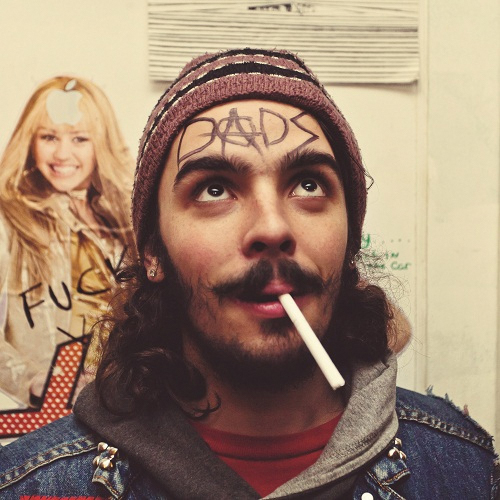The New Jersey duo Dads self-identify as an emo band, a designation borne out first and foremost in their style of play, a curdled and recumbent guitar noodling punctuated by moments of blustery abandon, rendered in a manner halfway between technical virtuosity and bare-minimum proficiency. From there the pigeonhole gets a little less snug: their lyrics are earnest but seldom melodramatic; at a glance, at least, they evince no particular heartbreak or longing, just an unexpectedly pragmatic kind of emotional wisdom. “When you’re this young and so excited,” one song yawps, “you won’t remember to set any goals.” Another wonders, “[If] we can pick out our faults enough to blame our parents, / why can’t we blame ourselves?”
The fit gets looser still. The title of Dads’ second LP, American Radass (this is important), would appear to lampoon the congenitally overblown stakes of emo discourse (as well as the Kid Rock song “American Badass”), and the names of the songs on it follow suit: the first is called “If Your Song Title Has the Word ‘Beach’ in It, I’m Not Listening to It,” the second “Get to the Beach!” The finest track, a seven-minute elegy to estrangement, is called “Shit Twins.” It is followed by a song—the one from which the quote above about setting goals is taken—that was written, according to guitarist Scott Scharinger, because “we wanted a song that was sixty-nine seconds long.”
Judging by the small handful of online materials that take up the question, Scharinger and rhythm section John Bradley maintain consistently that this sort of silliness is organic, happenstance, chuckle-shrug-guess-you-had-to-be-there. One title, they explain, is “a mix of a lot of drunken things we’ve heard or said”; another (“Shit Twins,” in fact) was named by an acquaintance “when he was talking about us and said it as a joking song title, which we ended up later using for this song.” The evident takeaway is that Dads don’t take themselves all that seriously, or at least that they don’t give any strenuous thought to how seriously they want to be taken. Even the name “Dads” is summarily disowned in the FAQ on their website wearentdads.com: “Dumb joke, dumb name. Means nothing.”
Why take their word for it, though? Taking yourself seriously is the closest thing this style of music has to a universal prerogative; emo songs are supposed to have names like...
You have reached your article limit
Sign up for a digital subscription and continue reading all new issues, plus our entire archives, for just $1.50/month.
Already a subscriber? Sign in





